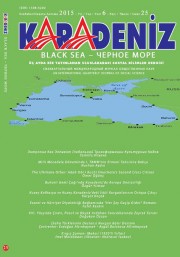Milli Mücadele Döneminde I. TBMM’nin Ermeni Tehcirine Bakışı
Grand National Assembly of Turkey (Tbmm)’s View on Armenian Deportation During the Independence War
Author(s): Nurhan AydınSubject(s): Government/Political systems, Pre-WW I & WW I (1900 -1919), The Ottoman Empire, Inter-Ethnic Relations
Published by: Kültür Ajans Tanıtım ve Organizasyon
Keywords: Deportation; council; Ottoman; Armenian; punish; world; war;
Summary/Abstract: Mondros Armistice Agreement which was made at the end of World War I was the beginning of a new era for the political life in Ottoman Empire. What Ottoman Governments, which were established after the Armistice Agreement, death with were the precautions that had been taken against the Armenian revolts and attacks during the World War I and punishment of those who had been in charge for the said issues. Claiming that they had been treated cruelly in this period, Armenian claimed many things from Ottoman Empire in this period. Because this condition was in favour of the Allied Powers, they usually interfered into the internal affairs of Ottoman Empire supporting the claims of Armenians and made serious pressures on Ottoman Governments. In this context, Ottoman Empire applied such policies as trying and punishing its officers who were claimed to have abused their offices during Armenian deportation, in order to relieve the pressures put by the Allied powers and prevents their using the claims of Armenians as a pretext. Actually, the reason why this issue remained on agenda is that it was used as a domestic political affair. Therefore, Armenian deportation was used as a domestic political issued on one hand and as a tool for condemning and destroying a nation on the other hand. The armistice agreement climate offered a good opportunity for doing it. It is observed that although Allied Powers and Armenians had different purposes, they used the same means. The Armenian deportation which was used as an instrument for the domestic politics, during the time a nation was at the point of life and death, paved the way for Allied Powers to achieve their objectives. Under the pressure of European countries, Ottoman Governments also did not do their duties duly. After National Pact was accepted in the Last Ottoman Parliament, the perception about the Armenian issue changed critically. It was declared that the rights to minorities would be accepted if the Muslim minorities in the neighbouring countries were given the same rights. It was a process. It was the first firm stance against Europe with regards to Armenians. Of course, this process was led by the National Resistance whose leader was Mustafa Kemal.
Journal: Karadeniz Uluslararası Bilimsel Dergi
- Issue Year: 2015
- Issue No: 25
- Page Range: 20-34
- Page Count: 15
- Language: Turkish

